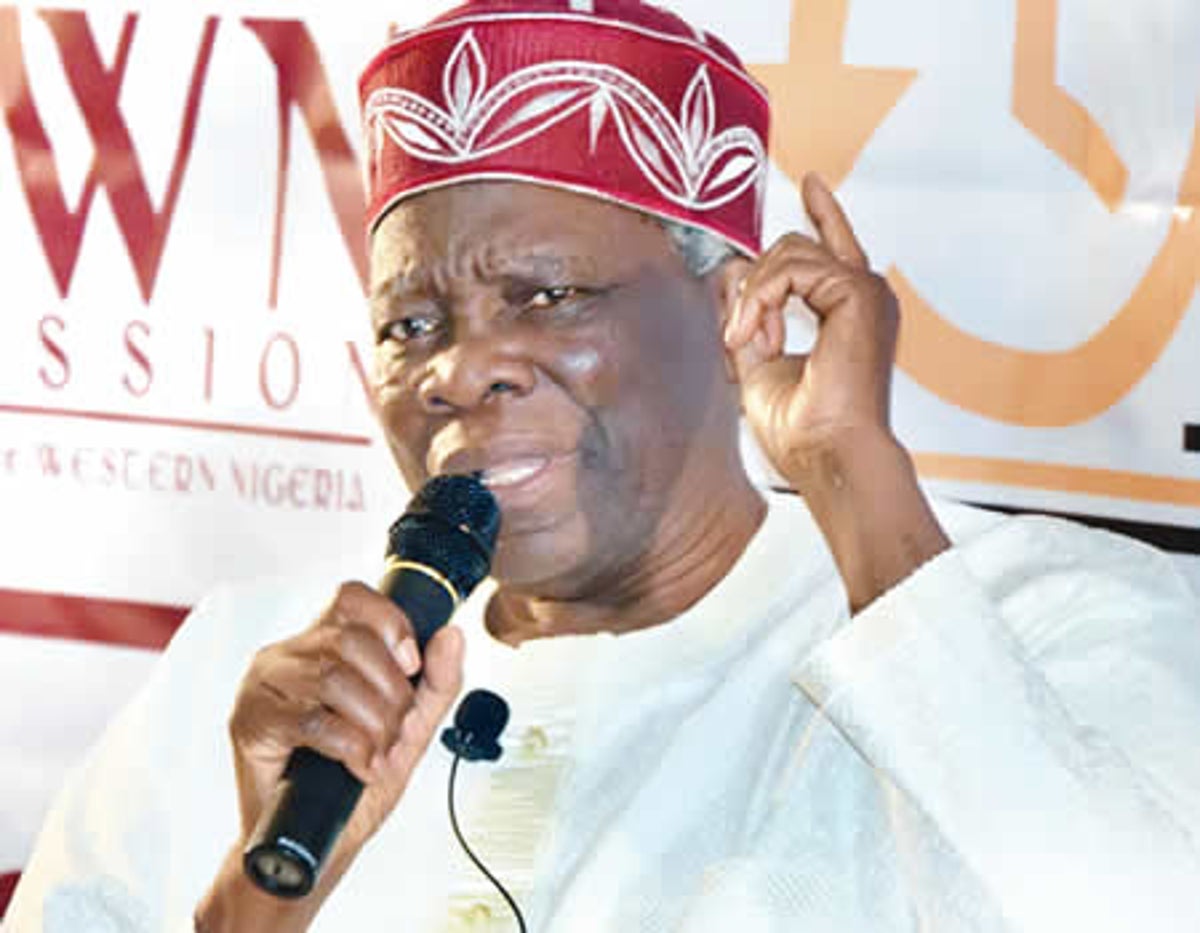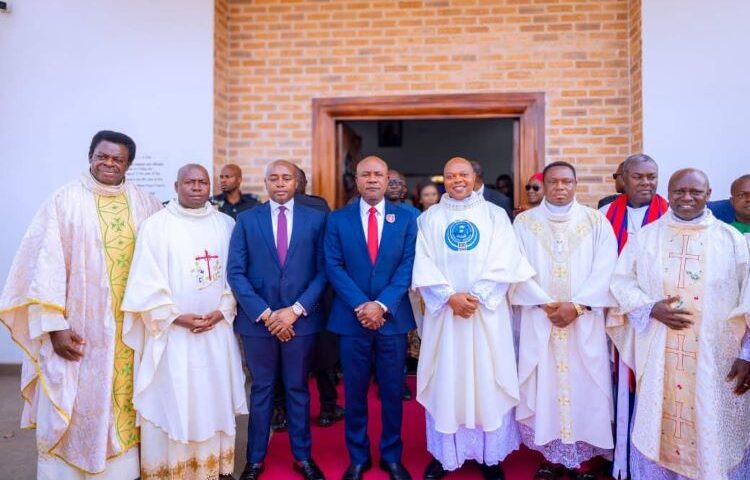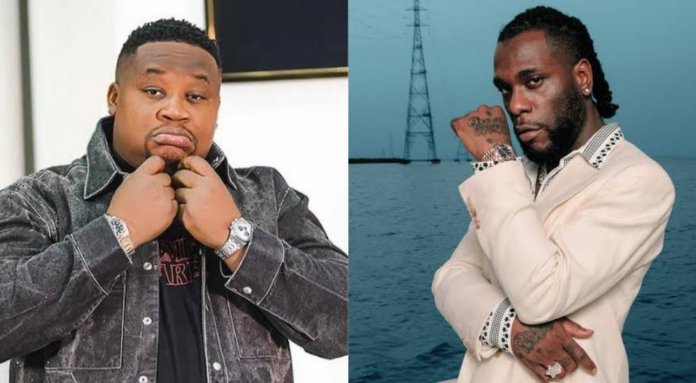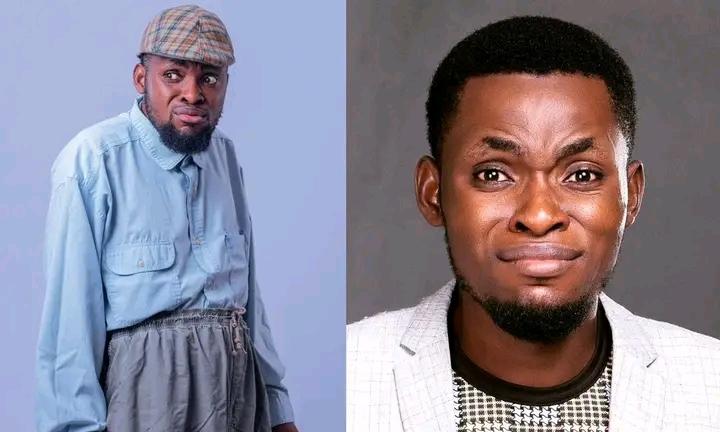*Professor Banji Akintoye providing new leadership to the Yoruba nation while the like of Asiwaju Bola Ahmed Tinubu and co. grovel before the north
Unrepresented Nations and Peoples Organisation (UNPO), an international body in the Hague, Netherlands and saddled with helping unrepresented and marginalised nations of the world to make a case for independence before the United Nations (UN), recently admitted the Yoruba and Igbo nations into its fold as the 45th and 46th members respectively. A renowned historian and leader of Yoruba World Congress (YWC), Professor Banji Akintoye, whose team championed the admission, spoke to Dare Adekanmbi on the implications of the development for Yoruba nation’s relationship with Nigeria, the case made before the world body, among other things.
You and you team in the Diaspora worked hard to get the Yoruba nation admitted as the 45th member of the UNPO. What does this development mean for the Yoruba?
It only provides protection for the Yoruba nation. We are part of Nigeria now and this admission into UNPO protects us now. It means the things we have a right to do, but which we have not been too courageous to do, we can now do. For instance, we set up Amotekun to defend ourselves in Yorubaland; the Federal Government was saying it was illegal. If we had been admitted into UNPO by that time, we would have gone to the international community to defend Amotekun and we would have had a very strong support there. If we want to strengthen our culture by now amending the federal law about education and we want to teach our history in our schools, we can now do so without any molestation or if we are molested, we now know where we can go for reprieve. Ultimately, peoples who join UNPO are indigenous peoples in larger countries and who have concerns and fears about their nations and who need help for advocacy and support abroad. So that you have a body like UNPO, which is peopled by those who have the expertise and the image to take our case before the United Nations (UN) and to guide us on how to put our case together before the UN, the African Union and so on and get results for us.
Our admission into UNPO goes so far. For instance, we live in a country where our progress has been impeded continuously since 1962. We can now really resist that and and an answer to that and not continue to be part of Nigeria’s retrogression and decline. On the international scene, we can take part in sports without being part of the Nigerian team and we can promote our culture abroad without any fear of being impeded by Nigeria. So, it is a very large thing that the Yoruba nation stands to gain from this. And ultimately, when the time does come, our people, as long as we conduct ourselves peacefully, which is a condition from UNPO, can say they want to hold a referendum to determine what they really want. Some countries that were members of the UNPO have achieved their independence and become members of the UN through the help of UNPO.
What kind of arguments did you canvass to UNPO officials that made them admit the Yoruba nation as one of its members?
For the Yoruba or any other nation in Nigeria, going to the UNPO and making a case is very easy. The world knows what is happening to the Yoruba nation in the Nigerian federation. First, we said we are an indigenous people, a nation with our own language, homeland territory, culture, history. The world knows these things to be true and nobody could say no to the argument. The second thing is: we are an indigenous people who are being denied the fullest of our lives. That also can’t be contradicted. The world knows Nigeria is brutalising its nationalities. At some point, the Federal Government banned the teaching of History in our schools. The people who are listening will say ‘In this modern world? Teaching of History is banned?’ The Federal Government dictates the standard of education and sets up all sorts of bizarre organisations to unify education, the Joint Admission and Matriculation Board (JAMB) and so on. They asked: where is your own federation? We said there is no federation. They call it a federation, but it is not a federation. We can go on and on. Our culture is under attack. People are coming from other parts of the country to brutalise our farmlands and many of our farmers are abandoning farming altogether.
So, making a case before UNPO is very easy for all peoples in Nigeria who are ethnic groups because what is happening to other ethnic groups is the same. Everything is being dominated and controlled from Abuja. One of our young governors, after serving for eight years, made a very significant statement which people don’t seem to listen to. He said anybody who is a governor of a state and calls himself the Executive Governor of the state is deceiving himself, the people and the world. All governance is decided in Abuja. There are federal roads in the states and these roads get bad, but the state governors can’t touch them and if they do, the Federal Government won’t reimburse them. So, the state governors don’t touch the federal roads and the federal roads are strangulating us. When we told that kind of story to them at UNPO, they said ‘really?’ People are shocked about what is happening in Nigeria. So, getting the membership of an organisation like the UNPO is pretty easy.
Do you have information to the effect that the Igbo nation too has been admitted as the 46th member of the body?
Yes, they have been admitted into UNPO like us the Yoruba. They have written letters to congratulate us and we have in turn written to congratulate them.
In the statement you issued announcing the admission of the Yoruba nation into the world body, you described the development as a very important step in the collective quest by the Yoruba to achieve dignity and self-determination. Were you saying that the Yoruba, with this instrument at their disposal, can decide to dismember from Nigeria anytime they so wish?
Well, we have not yet said we are leaving Nigeria, but we need to have our dignity, self- respect and self-determination restored in Nigeria. Our fathers who agreed to enter us in 1947-1949 into what was evolving as a modern country, because before then, there was no Nigeria really, made it clear what we wanted. After the amalgamation, the British didn’t know what to do with Nigeria, except that Nigeria was good for them to exploit. It was after the Second World War that they began to work on the constitution that would make us a country. And from day one, we the Yoruba made it clear that the only kind of relationship that we desire in Nigeria was a federation. The first memo written by the Yoruba people on this was written by the Egbe Omo Oduduwa in 1949, that a federation is the only acceptable kind of government that the Yoruba people would take part in; that a federation is the only way to run a multi-ethnic country like Nigeria.
So, the British accepted to that and after a series of constitutional conferences until we finally came to 1957 when it was finally all ratified. Nigeria was ratified a federation where each federating unit would run its own affairs, manage its own economy and a Federal Government that will do some things that the country needed to do together. That was the constitution that our fathers agreed to and made it possible for our leaders, led by Chief Obafemi Awolowo, to record the massive achievements of the 1950 up to 1962 when the Federal Government then disrupted our region and took over. Our father, Chief S.L. Akintola, made the mistake of surrendering the freedom of our region to the people controlling the Federal Government. Ever since, we have been going down as a Yoruba nation because the direction of Nigeria’s growth has been downwards, and we are going downwards as well.
Admitting the Yoruba nation is a means to an end and to achieve the end result, the buy-in of the political class in the region is very key and as presently constituted, more than 90 per cent of the region is controlled by the party at the centre. These politicians always try to be in the good book of the president and may not support anything that will give the president a sleepless night?
Yes, you are right. But the Yoruba nation now has in its hands an instrument it can use to establish its independence within Nigeria. We have been begging the Hausa/Fulani who are in control of federal power to let us do restructuring. Well, we can now do something differently. For instance, with our membership of UNPO, it is now possible to set up a sort of indigenous people’s government of our own that will represent us at the international level. We can now have our own flag and things like that without leaving Nigeria at all. On the question of the political people, our politicians are operating in a system that has been made to keep Nigeria subjected to the federal authority. So, they grew up under that system and that is the only that they know. There is no ruler of any part of the country called Nigeria that is not afraid of the Federal Government because the Federal Government gives them the money monthly and can twist their hands to make them do whatever it wants.
We came up with the Amotekun initiative, the Federal Government said it was illegal for us to gather our young men to defend our land from the Fulani people who were ravaging our land. The Federal Government has the authority to stop anything that is good for us. They believe they have the authority to stop our governors from doing whatever they believe is good for us, but not good for their own people. Actually, when our governors are being sworn in, they don’t swear to protect and defend their own people. They swear to protect the constitution of Nigeria. The oath they swear to, is very antithetical to federalism. A governor is elected to protect his people. The person who is elected the president is elected to protect Nigeria and its constitution. Each state in Nigeria should have its own constitution, which the governor of the state will swear to protect. All these young men who in politics have been growing up under this system of arm twisting that is how much they know. How many Yoruba people went to the National Assembly to protest when the Fulani people were attacking the South-West and destroying our agricultural economy? How many Yoruba legislators dared to stand up to say their people are suffering? None. That is the way it is.
Are you optimistic that the initiative will get the support of the South-West governors and all Yoruba leaders, irrespective of their political affiliation?
The most important thing is the people and not the governors. The people themselves must show to their leaders what they want from them. That is all. The tail cannot wag the dog. It is the dog that must wag the tail. It is not the governors that we are actually looking at; it is the Yoruba people. And by and by, the governors will have to play ball about how the people want it. For instance, it was the pressure from the people that led the governors to hold meetings, which led to the creation of Amotekun. We can do more of that in every field. We can ask the question: why are the Yoruba schools being run like the Nigerian schools?
We the Yoruba are far ahead in education. Nigeria can teach its own children anyhow and give them the ugliest education in the world. We Yoruba don’t want to do that. We want our children to be among the best in the world. We want to live in a nation that is strong in science and technology, in the arts and literature. That is why every Yoruba parent wants to be pouring their resources into educating the children. At some point, we will have to stand up and ask questions, especially now that we have the instrument that can protect us. We must operate peacefully. That is our agreement with the UNPO. We operated peacefully on Amotekun and so we will operate peacefully to get the Yoruba kind of schools, get modern agriculture where young people will be proud to be farmers. We will operate peacefully and turn many of our cities into smart cities. Whether Nigeria agrees with us or not, we will do all of those things in Nigeria, without leaving Nigeria.
With the Yoruba and the Igbo gaining international recognition, what do you think will be going on in the mind of the leadership of the country, especially when successive governments have been mouthing the indivisibility of the country?
The people who hold on tightly to power at the centre are behaving like typical powerful people. We have been shouting about restructuring and they have laughed in our face. Yes, power is in their hands and there is nothing they can’t do to continue to hold the power. So, they ignored the arguments for restructuring. So, they are holding the country. But one thing has been clear for a long time: many of our old men in Yorubaland, like Chief Ayo Adebanjo, Aare Afe Babalola, Chief Olu Falae and some of our obas, have said it that no restructuring will soon mean no Nigeria. We have been saying it.
But what do you think the southern leaders can do for them to get back the presidency in 2023?
We have the Yoruba Igbo accord called the handshake across the Niger. We have the Southern Nigeria Peoples Assembly made up of Yoruba, Igbo and the Niger Delta leaders. All of that will amount to nothing unless the peoples of the South begin to use the powers in their hands now to show that they want to go their own way. That is the only way they are going to get a southern president, the only way to get Nigeria restructured and get a return to the federal arrangement of the 1950. If we continue to appeal and continue to threaten as we have been doing, the people controlling power in Abuja already know there is nothing in our threats. The important thing is that the peoples of the South must put some fire in the gas and not let it be just gas. By this, I don’t mean any violence and there is no need for any violence. We must not let our young people be going out to riot on the streets and getting killed in the process. We must have a good hold on our younger generation. But all of us must insist together that we are ready to go this far, and we have come this far and we are not ready to go any further. We have been declining fast into slavery. So far, we have gone; beyond this point we won’t go any more. There is nothing criminal about that. But we must now play politics that the world can relate to. That is a code of conduct that the world and international community will relate to happily. The moment we begin to use violence and so on, we have lost the battle and the war. But we must insist we won’t go any more into slavery.
What kind of support will UNPO give the Yoruba or the Igbo if, in their quest to recourse to the instrument of their membership of the body, there is a covert move against such from the federal authority in Abuja?
When the Fulani people were killing our own people and the Federal Government was playing game with the matter and refused to support us and put a resistance against the killing, we had a strong case to make before the United Nations, but we didn’t know how to do it. Now, we have an organisation that we can run to and make a case. They will guide us on how to make our case before the United Nations in such a way that it will be difficult for the UN to refuse to act.
When you said it will be difficult for a southern president to emerge in 2023, were you speaking in the light of the headship of the key institutions relating to election matters: INEC, security agencies and so on being mainly from the North?
The northerners are everywhere. They are in control of the security apparatus of the country in absolute terms. So, whatever they want to do they can do. As for INEC, that is an instrument of the same Abuja total control. The police, army, DSS, Customs, and even the ports and so on are all parts of the same package.
Do you see the growing ethnic tensions in the country reducing if the Federal Government decides to dust up some of the recommendations of the 2014 national conference for implementation?
If they decide to go to the 2014 national conference report and set up machinery for looking at it and actually implementing the recommendations, that will be a welcome step. But it will not be enough for us to lower our guard. We must continue to hold our guard high. We have been let down far too many times in this country.
What role do you envisage for the National Assembly in ensuring that a reform of the political and economic architecture of the country in a way that fears will be allayed, and tensions de-escalated?
The power system has been so manipulated to make a section of the country dominant in the National Assembly. Also, the whole power structure makes the average legislator incapable of defending the interest of the people. We have been shouting since 2015 that the Fulani people were ravaging our farmlands, how many legislators from the South-West have ever stood up to say their people are suffering? The power system has made it impossible for them to do so. It is not that they are not patriotic. Many of them are our own sons and they don’t want their nation to perish or disappear. But they are operating within a system that makes it impossible for them to defend their nation. That is what is happening. Some people will attack our legislators for doing nothing. No. That is an immature way of handling the matter. It is the system that is toxic.
How can the Yoruba nation operate with this instrument in a way that it will not be seen to have run foul of the 1999 Constitution, which governs the entire country?
As for the 1999 Constitution, it should be abolished and another one written, a new constitution that will allow each state to manage and decide its own local government structure and the number of local government councils it will have. The new constitution will also remove the number of local governments from the principles used to share federal allocations. They have created more local government for the North just to enhance the power of the North to get more of the share of federal money. Lagos, which is more densely populated than Kano has 20 local government councils while Kano has 44, after Jigawa State, which has 23 local government councils, was carved out of Kano. In addition, the 1999 Constitution is a fraud and not a constitution by the peoples of Nigeria. It is a decree of the military government.
Professor Banji Akintoye the LEADER OF YORUBA nation first granted this interview to Nigerian Tribune, published on Sunday, May 10, 2020





